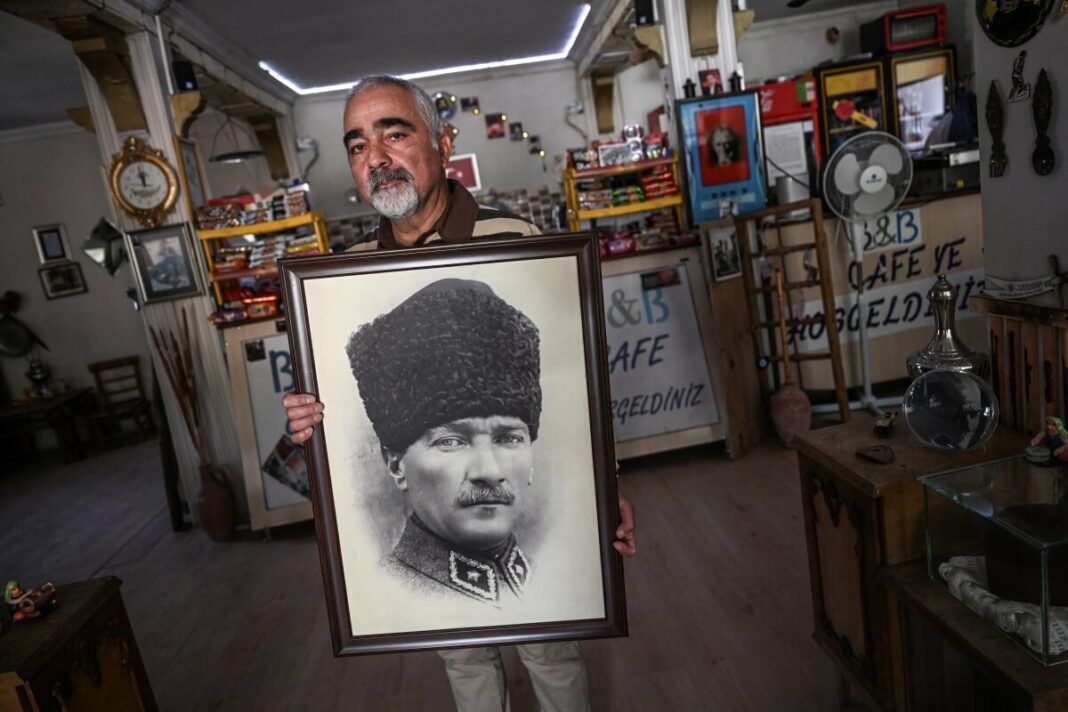Standing at the foot of the cliff overlooking Kemaliye, the golden statue of Mustafa Kemal Atatürk, the father of the nation, evokes the glorious past of this small town in eastern Turkey.
Atatürk rewarded the loyalty of the town, nestled between the mountains and the sources of the Euphrates, by giving it his name ahead of creating the Turkish republic out of the ashes of the Ottoman Empire 100 years ago.
“The whole country would have wanted to bear his name but he would never have accepted!” said retired hotelier Hacı Ömer Yalçınkayalar, referring to the modest nature of Atatürk, who will be celebrated on the nation’s anniversary on October 29.
General Mustafa Kemal, hero of the Dardanelles war against the Allies, in 1919 began confronting the Westerners who occupied the dismembered empire to found the independent nation he longed for.
His forces found themselves nearing disaster at the gates of Ankara in 1921 when he received a telegram from Egin, a trading town at the crossroads of Anatolia and the Caucasus, with an Armenian population.
The telegram read: “Dear Pasha, we have 500 horsemen ready to leave at your command,” recounted Yalçınkayalar.
Situated on the caravan routes heading towards Baghdad, Iran and Georgia, the town was prosperous.
This is evidenced by the persisting stone and wooden houses that were built along the steep slopes of the mountainside, which town authorities requested to be classified as a UNESCO world heritage site.
The entire district had around 20,000 inhabitants including some 6,000 in Kemaliye itself in Atatürk’s time, compared with 1,500 residents today.
“In the end, they didn’t have to do it,” Yalçınkayalar said of the offer to send horsemen.
But Atatürk did not forget the gesture and, a year later, he wrote to the Egin municipal council to offer his name.
“It was given to us as a gift,” said the 73-year-old who has devoted his retirement to his town’s history. “It honors us: with the republic, we joined the civilized world.”
‘Very special love’
At the foot of the statue, a sign reads: “To thank the district for the support it gave for the national independence, its name is changed from Eğin to Kemaliye.”
Kemaliye has been home to many celebrations including concerts, football tournaments and banquets on every October 29 since the birth of the republic in 1923.
In Güzide Tüfekçi’s family, the story is passed down with enthusiasm: the 60-year-old former literature professor, an enthusiastic Kemalist, recalled what Turkish women owe to Atatürk and the republic.
“He opened the way for enlightened Turkish women, intellectuals, to have access to education, to have a profession. We’re proud of him,” she said.
Facing a small train station that has served Kemaliye since 1938, a modest cafe is decorated like a museum.
Erdal Erdurk, 59, has hung portraits of Atatürk on all the walls — in color, in black and white, in a soldier’s uniform, in a tuxedo or wearing his Astrakhan hat — and hung a huge red flag bearing his image above the entrance.
After vigorously cleaning the dust off one of the frames, which he kissed before hanging, Erdurk spoke of “the very special love of the town for Atatürk”.
“He is our protector. He founded our country, our republic: all these portraits that you see here, are just talking about them, it moves me,” he said.
Yet the town itself refrains from displaying its history: its streets are barely decorated and only a few windows reveal the portrait of the celebrated man.
Şevket Gültekin, 62, a taxi driver and singer, holds the key to a small museum that is the most decorated.
Tourists who visit the region mainly come to admire the “Dark Canyon,” one of the five deepest in the world, according to UNESCO. It is often only upon arriving in Kemaliye that they discover its past.
“When our guide taught us, it made us happy,” said Haluk Mutluay, 58, from the coastal city of Mersin, in southern Turkey.
“Atatürk means a lot to us, he’s our father.”
© Agence France-Presse



